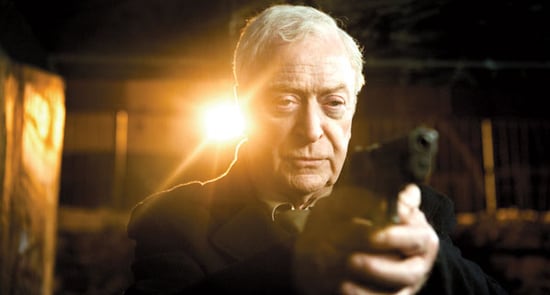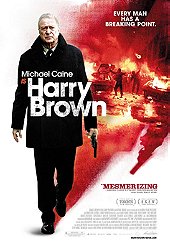Inevitably, Harry Brown will be branded as Death Wish for the 21st Century, and the UK's answer to Gran Torino. In fact, this 2009 production - which marks the feature film debut of Daniel Barber - is an intriguing mix of its two aforementioned predecessors; merging a timely portrait of contemporary street crime (similar to the Charles Bronson action vehicle) with the idea of an elderly serviceman bearing witness to the decline of the area he has called home for decades (much like Clint Eastwood's Gran Torino). Despite being imbued with these winning characteristics, Harry Brown undeniably remains a slice of wish fulfilment revenge fantasy cinema. Thank God it's also expertly-crafted, and a gripping example of British filmmaking.

Michael Caine plays the revenge-dispensing title character of Harry Brown; a 70-something ex-Royal Marine who lives in a run-down neighbourhood now ruled by feral teenagers (more commonly referred to as "chavs"). With his wife having recently passed away due to natural causes and his best friend bullied to death by the drug-peddling gangs of the local area, Harry is left alone and emotionally withdrawn. Moreover, the authorities have been powerless to solve the killing of Harry's best friend, and Harry is determined to see justice done. Armed with military experience and bucket-loads of anger, he thrusts himself into gun-toting, death-dealing action to clean up the neighbourhood.
In lesser hands, the narrative of Harry Brown could've played out like a Death Wish sequel (let's not forget Charles Bronson was 72 years old when he kicked serious ass in Death Wish 5). But Daniel Barber handles the material with an unmistakably realistic, gritty tone. The character of Harry Brown is not some daft superman of a granddad vigilante - similar to Clint Eastwood's Walt Kowalski (from Gran Torino), Harry is just an ordinary man who's pushed too far, and who's constantly marred by his limitations as a senior citizen. Thankfully, too, Harry is not merely one-dimensional - he feels like a fully-formed human being; reinforced during the film's first half hour which potently observes the character as he goes about his ordinary daily activities. Thus, when he exacts his savage payback, a viewer can comfortably cheer him on.

This brings us to the topic of the film's moralistic standpoint. Look, the film does not advocate vigilante justice. Harry Brown displays the effectiveness of actions outside the realm of prescribed law, but the tone is unmistakably downbeat (as opposed to Death Wish, which was light exploitation cinema). Moreover, it may ostensibly seem wrong for Harry to slaughter the unruly teens because it's gradually revealed his friend was slaughtered in self-defence. If one digs deeper, however, one will learn that self-defence merely entails disarming an attacker, whereas these "chavs" disarm Harry's friend before beating and stabbing him with intent to kill.
A major asset of Harry Brown is Michael Caine's magnetic, badass screen presence. As Empire said, the film reconfirms Caine as the unparalleled king of cool. Indeed, there's an unmistakable touch of Jack Carter as he lays waste to every mugger, peddler and hoodie he crosses paths with. More importantly, even when Harry is doing very little, the masterful Caine keeps you interested - he holds the film together with several solemn-eyed close-ups and a subtle hint of emotional turmoil boiling beneath his hard exterior. But Emily Mortimer, playing a determined Detective Inspector, is wooden, while Charlie Creed-Miles does what he can with a thankless role of a naïve police officer. Liam Cunningham, who delivered such an unforgettable performance in the 2008 film Hunger, is highly compelling and convincing as one of Harry's old friends.

Daniel Barber - the Oscar-nominated director of the 2007 short The Tonto Woman - displays an astute cinematic eye and ear in Harry Brown. The opening sequence, shot as if from a mobile phone camera, is visceral, and endowed with unsettling immediacy. The housing blocks and locations in which the story transpires heighten the authenticity and grittiness, as well. This is also one of the most gorgeous British films of the decade - the colour palette has been duly dipped in inky blacks and autumnal browns; recalling the rich, shadowy look of The Godfather or the urban darkness of Se7en. For this, credit belongs to the ace rising-star cinematographer Marin Ruhe (whose prior work includes Control). However, despite the technical proficiency, the film is strictly cartoon-level in terms of character and story. It's the predictable Death Wish formula played out on the streets of 21st Century Britain with one-dimensional villains and useless policemen. More importantly, the film depicts some uncomfortably extreme solutions to dealing with misbehaving teenagers without getting to the heart of the issue. Another grave miscalculation is the use of digitally-created blood which at times exhibits distracting phoniness.
As a slice of histrionic Charles Bronson-esque revenge cinema, Harry Brown delivers, and pushes all the right buttons. Although not quite as accomplished as Shane Meadows' exceptional Dead Man's Shoes, this is a powerful and vital example of modern British filmmaking.
8.0/10
 Login
Login